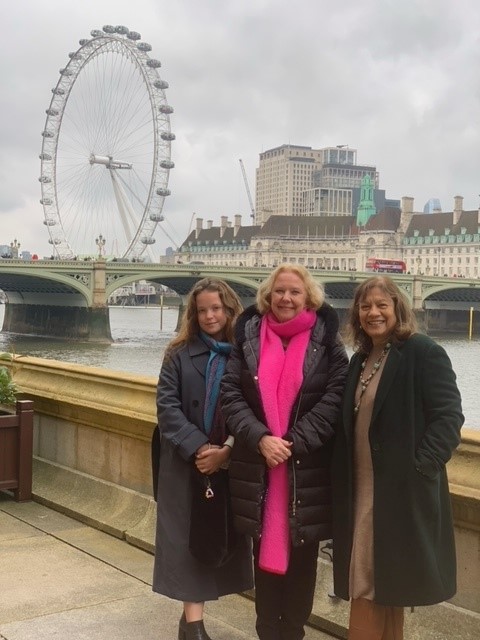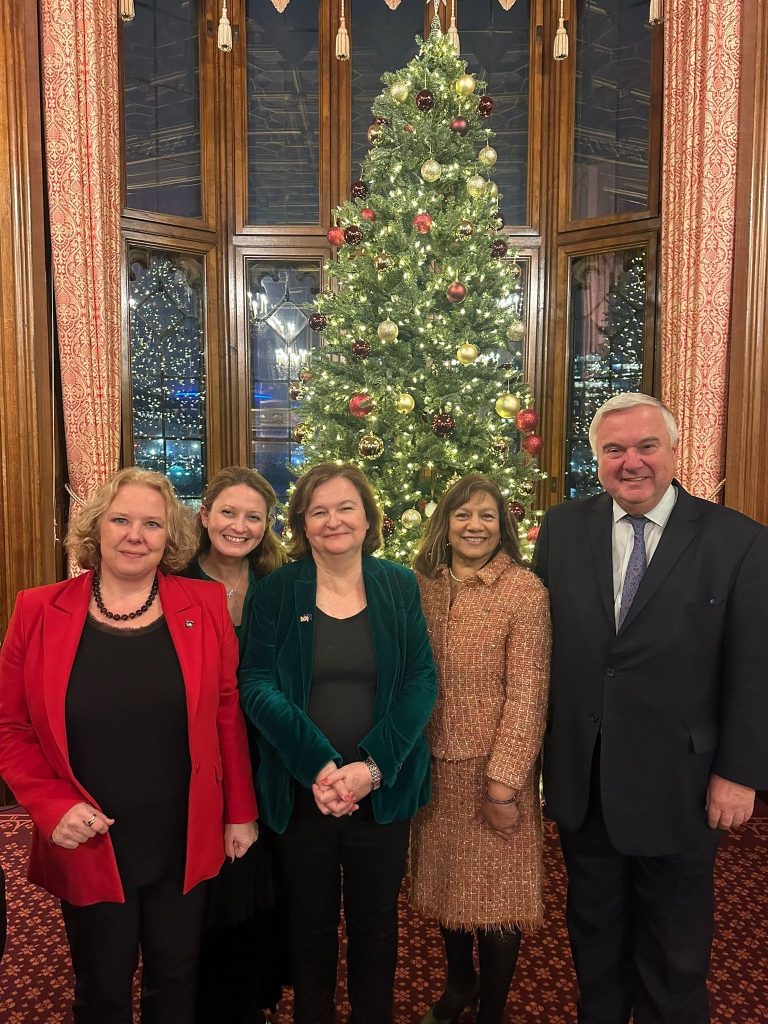- 05/12/2023
- Posted by: Valerie Vaz MP
- Category: News
The UK-EU Parliamentary Partnership Assembly (PPA) took place on Monday 4 and Tuesday 5 December 2023 in London. The PPA is a delegation of UK members of both Houses and a Delegation of Members of the European Parliament.
The PPA was established under the terms of the 2021 Trade and Co-operation Agreement and acts as a forum for parliamentarians to exchange views on the implementation and operation of the Agreement. The Agreement established a Partnership Council as a joint UK-EU body which will inform the PPA of its decisions and recommendations. The PPA may make recommendations to the Partnership Council.
The Parliamentary Partnership Assembly meets twice a year, once in London and once in either Brussels or Strasbourg, issuing a report following each meeting.
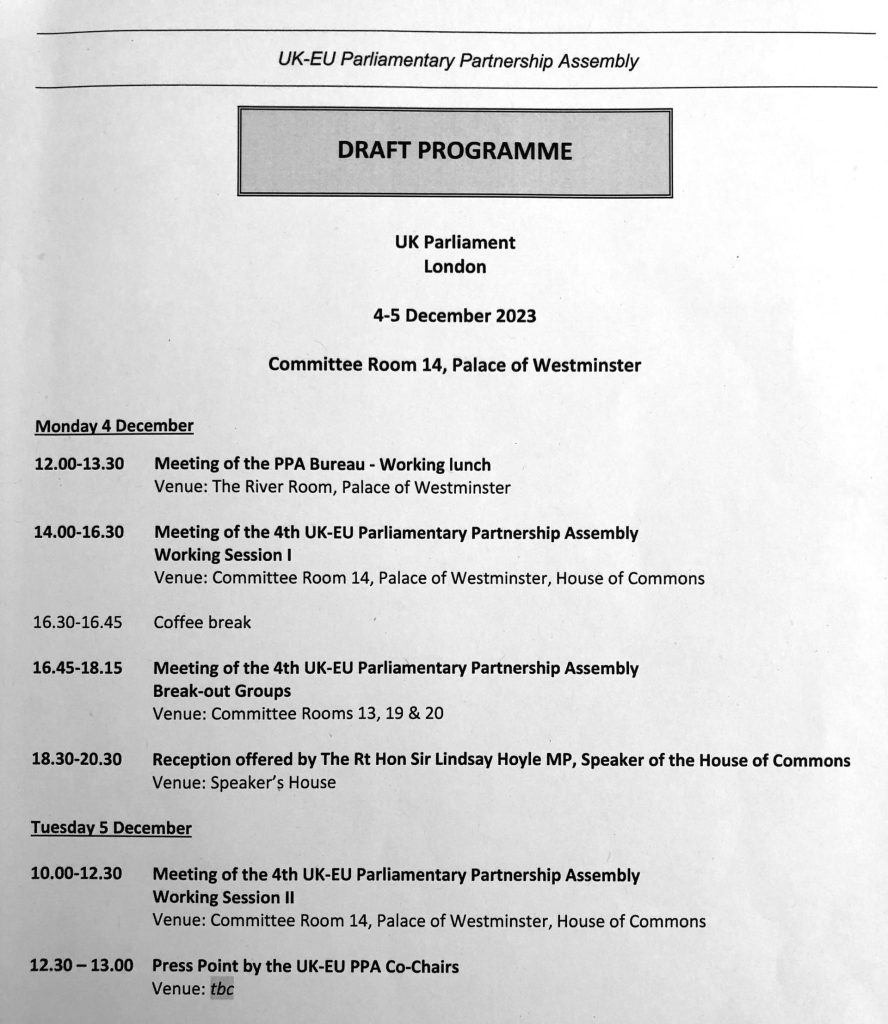
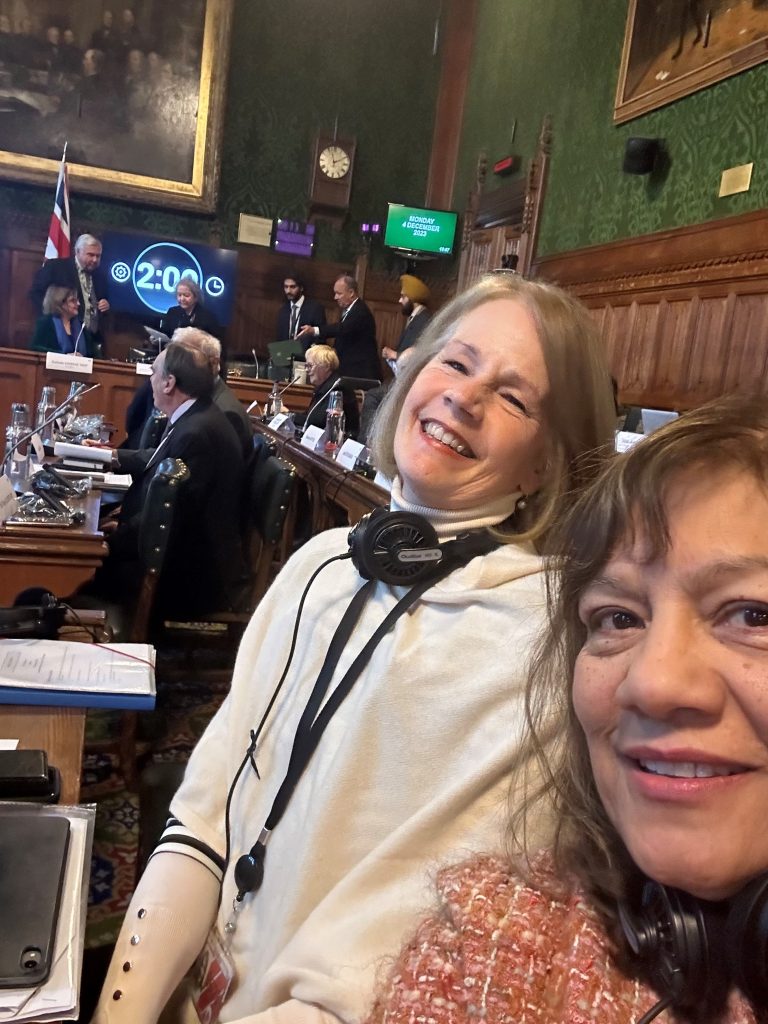
Monday, 4 December 2023:
The proceedings were opened by the Co-Chairs Rt Hon Sir Oliver Heald KC MP and Ms Nathalie Loiseau. Dame Rosie Winterton, Deputy Speaker of the House of Commons and First Deputy Chairman of Ways and Means gave the opening address welcoming the delegates to Parliament.
The agenda and the minutes of the meeting on 3-4 July 2023 in Brussels were agreed. The Lords are also part of the delegation.
State of play within the Partnership Council was a topic for discussion. I spoke in the debate and asked if the minutes of the meetings of the Partnership Council could be published in a timely manner. They have the power to make laws adopting formal decisions but there is a delay in posting on the various websites. I asked what discussions there had been about Gibraltar. I gave examples such as Mutual recognition of organic food schemes which took effect in January 2022 but needed to be reconfirmed by the end of the year. The minutes of the meeting about EU VAT one stop shop were not available. Similarly the Mutual Recognition of professional qualifications the Partnership Council sets the timetable but it is not clear what that is and there has been no decision since July 2023. The Partnership in EU programmes made a decision 4 December 2023 with a start date of January 2024. It is vital that information is disseminated as soon as possible so that there is no information gap.
PPA recommendation, adopted on Monday, 4 December 2023: Youth mobility schemes, student exchanges, school trips, and touring artists
Youth mobility
1. Notes that mobility involves the right to live, study and work in another country and must be differentiated from travelling;
2. Believes that facilitating reciprocal youth mobility to travel, work and study between the EU and the UK creates valuable opportunities for cultural exchange;
3. Notes that the UK has reciprocal youth mobility arrangements with over a dozen countries and territories; notes the UK’s Turing Scheme promotes outward educational mobility opportunities including within the EU and that the EU has programmes such as Erasmus+, Creative Europe and the European solidarity Corps that facilitate mobility, education and cultural exchange with third countries; recalls that the EU remains open to wider association in the Erasmus+ Programme;
4. Underlines that the mobility arrangements should be drafted in a manner that avoids any form of discrimination;
5. Acknowledges the possibility for short term visa free travel, but further acknowledges the lack of youth arrangements between the UK and the EU;
6. Notes that there have been discussions between the UK government and some, but not all, Member States, about the possibility of establishing such arrangements; acknowledges that these discussions create differences between the citizens of EU Member States and calls for a dialogue between the UK and the EU on this matter;
7. Notes the value of short-term labour mobility, but also considers that youth mobility has many benefits that extend beyond addressing labour shortages; further notes that au pairs from the EU currently do not benefit from the Youth Mobility Scheme visa;
8. Acknowledges that following the UK’s withdrawal from the EU, opportunities for people -to-people contacts, especially for young people across the EU and the UK, have been affected, but welcomes the respective value of the UK Turing Scheme and the EU Erasmus+ Programme in supporting youth mobility across Europe.
School visits
9. Believes that organised international school trips are a vital means for children to experience different cultures, learn to respect differences, broaden their horizons and knowledge, improve their language skills and create lasting positive connections between individuals residing in different countries;
10. Recognises that school trips between the UK and EU have become more difficult because of the requirement that each child travels with an individual passport and, for some pupils who are third country nationals, visa requirements;
11. Welcomes the March 2023 joint declaration by the President of France and Prime Minister of the UK committing to facilitation of school trips and exchanges; and that practical implementation of these commitments is being discussed in a UK-France Mobility Dialogue, and urges a conclusion without undue delay;
Touring artists
12. Recognises the intrinsic value of cultural exchange and creative partnerships, which foster mutual understanding between the citizens of our nations, enable networks fostering artistic creation and innovations that create benefits to culture, society and the economy, and maintain our strong shared beliefs in freedom of expression and cultural diversity;
13. Observes that strengthening cultural exchange is a focus of recent developments in both EU and UK foreign policy, as reflected in both the EU Work Plan for Culture 2023–2026, and the Integrated Review Refresh 2023;
14. Acknowledges that as a result of the UK’s departure from the EU Single Market and the Customs Union, UK and EU artists seeking to tour within the other party’s territory have experienced increased barriers to doing so, including visa or work permits, customs and transport restrictions;
15. Observes that the current situation can be particularly challenging for young and less established artists;
16. Notes that while the majority of Member States offer UK artists some form of short-term touring options without a visa or work permit, the maximum length of stay in a Member State varies between a single performance and up to 90 days in a 180 day period; and that the UK offers a 1-month period for paid performances and a 6-month period for unpaid performances comprising taking part in competitions, auditions and promotional activities as long as they are only claiming expenses or prize money;
17. Recalls that the EU-UK Trade and Cooperation Agreement provides for rules on the temporary import of goods, used by artists to import their equipment;
Recommendations
18. Recommends that the Partnership Council and the Member States work collaboratively to improve the opportunities for youth mobility between the EU and the UK;
19. Recommends that in the process of improving opportunities for youth mobility, special attention should be paid to procedural obstacles and costs, options for family reunification, access to public assistance as well as time and amount limitations;
20. Recommends that the Partnership Council invite the EU and the UK to accept that EU nationals and UK nationals can travel between their territories with identity cards in the context of organised school trips and that they remove the requirement for third country nationals to hold a visa when travelling in the context of organised school trips;
21. Recalls that the EU remains open to wider association in the Erasmus+ Programme and, noting the UK’s Turing Scheme which is also open to European students, encourages the Partnership Council to identify potential opportunities for greater cooperation to increase the number student exchanges between the UK and EU;
22. Urges the Partnership Council to prioritise the mobility of touring artists, with a view to developing a comprehensive approach that would allow artists and their teams to tour freely in the EU and UK – potentially as part of the forthcoming Trade and Cooperation Agreement Review3 – whilst recognising that this would form part of a broader political discussion encompassing a wide range of other issues;
23. Calls on the Partnership Council to work towards an agreement on streamlining visa, customs and work arrangements for touring artists and their teams; and
24. Calls for a redoubling of the efforts between the UK Government and the EU Member States to tackle artists’ concerns referred to above; for EU Schengen Member States to expand their offer for visa and work permit-free visits for touring artists and their teams up to the Schengen limit of 90 days in a period of 180, and to provide clear and comprehensive guidance online for touring artists and staff; and for the UK to reciprocate these efforts to reduce barriers to EU touring artists and to make clear information available online.
The delegation then moved into break-out group discussions on three topics: (1) Data protection, (2) Fisheries, and (3) Citizens’ rights. I attended the Data Protection group. Each group produced a set of recomendations that would be passed to the Partnership Council.
Tuesday, 5 December:
At 10am the meeting opened with a welcome by Rt Hon the Lord McFall of Alcluith, Lord Speaker.
There was a report from the break-out groups and feedback by Vice-Chairs on the discussions at each group. Then the PPA adopted the points of agreement which were the main issues raised during the break-out groups: 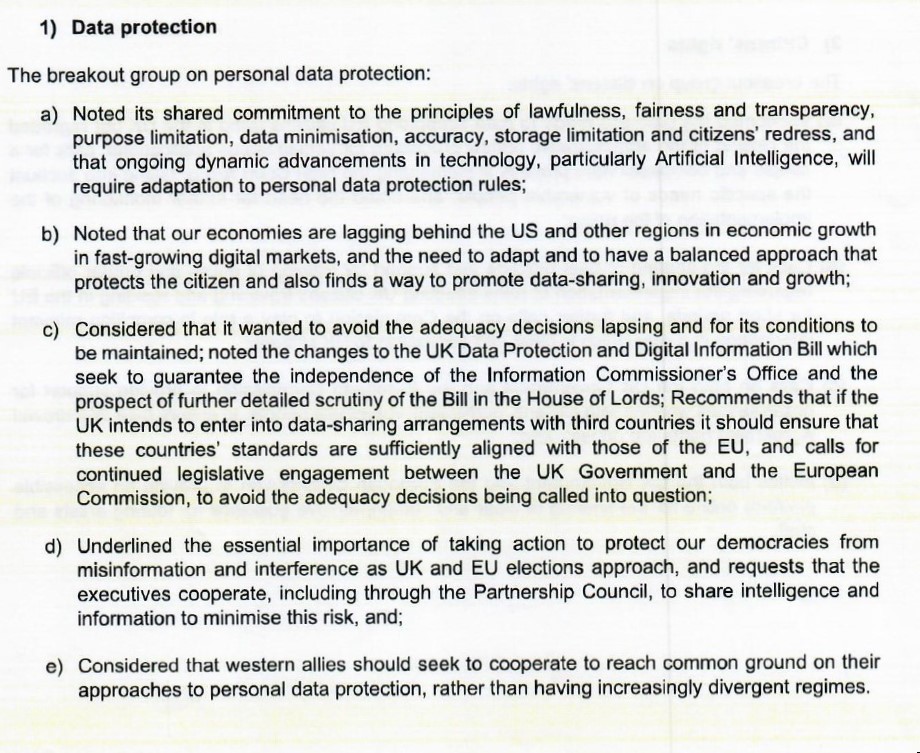
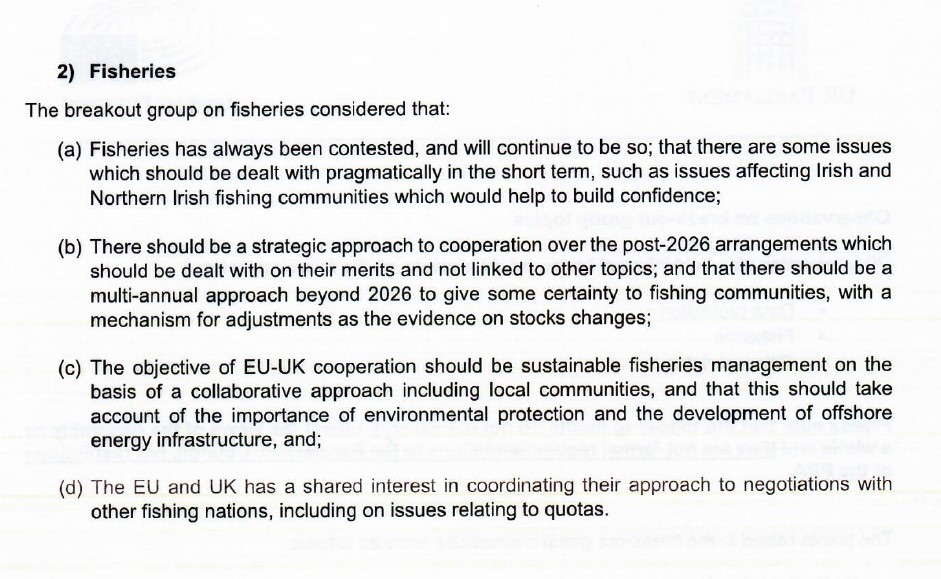
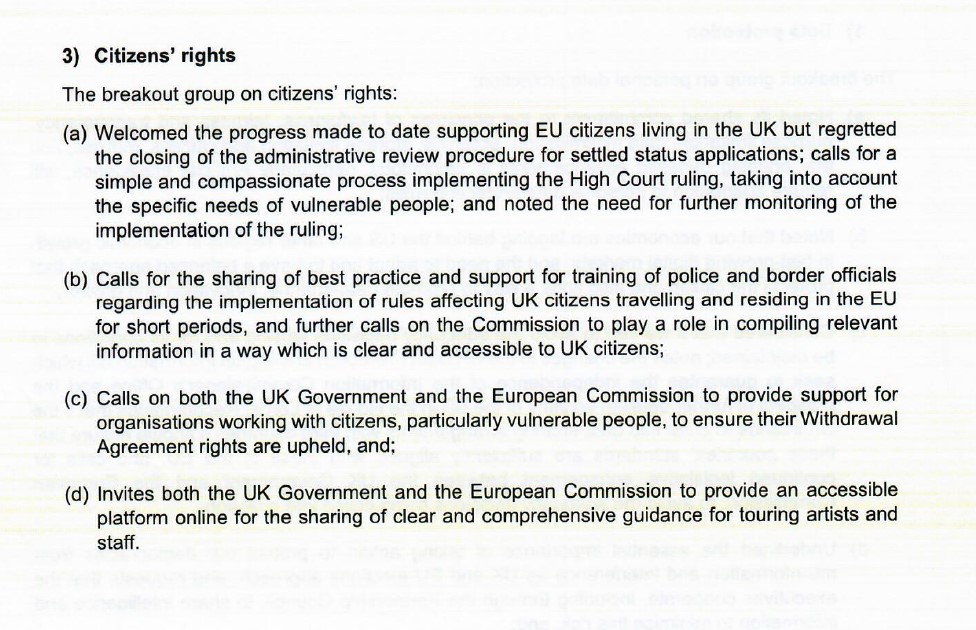
This was followed by an exchange of views on artificial intelligence and climate change, including the Carbon Border Adjustment Mechanism (CBAM).
Finally, there was a general discussion on the future work of the PPA, and the next meeting was confirmed as 18-19 March 2024 in Brussels.
In the main picture, you can see me with Co-Chairs Beatrice Covassi (MEP for Italy), Nathalie Loiseau (MEP for France), and Sir Oliver Heald MP (North East Hertfordshire).
